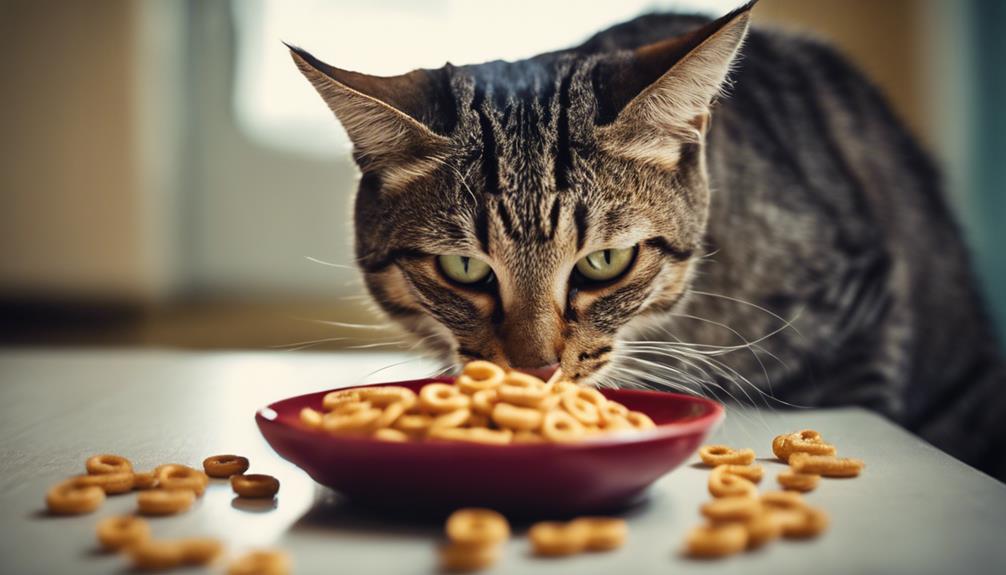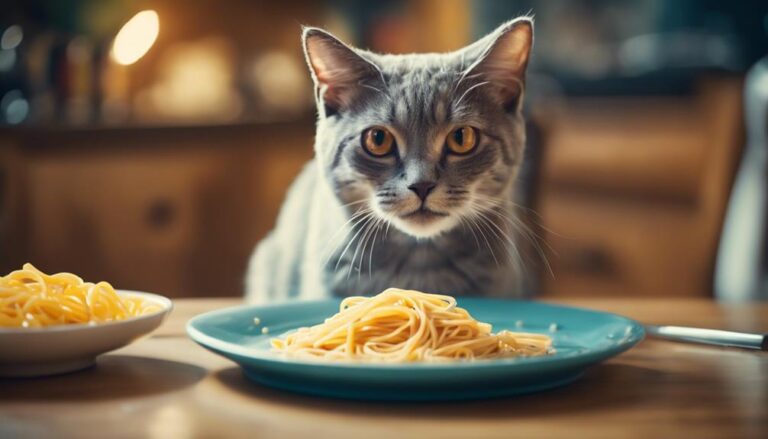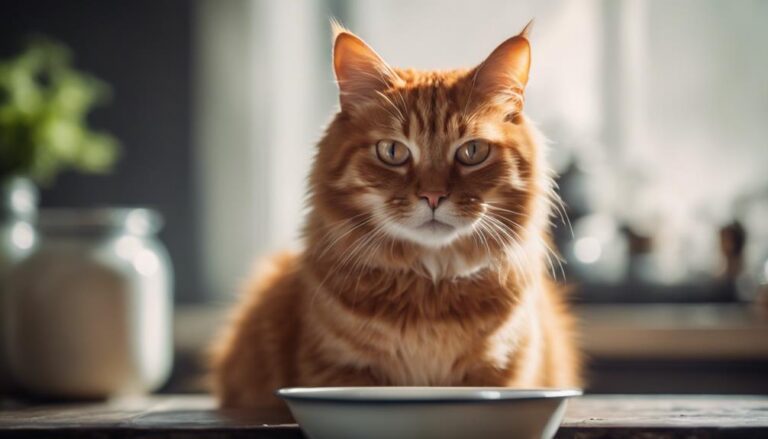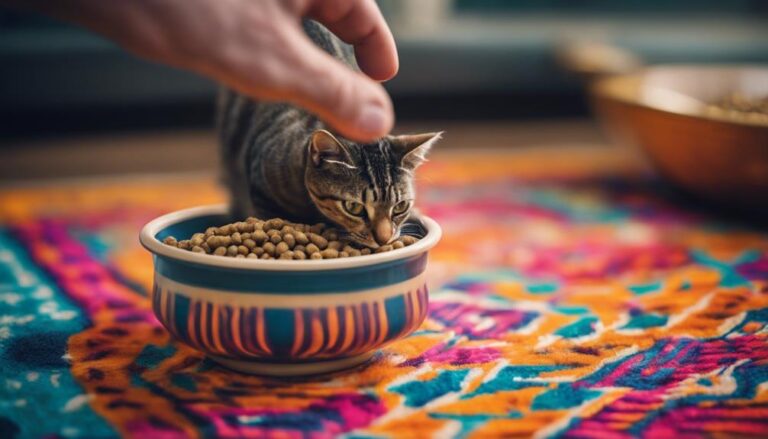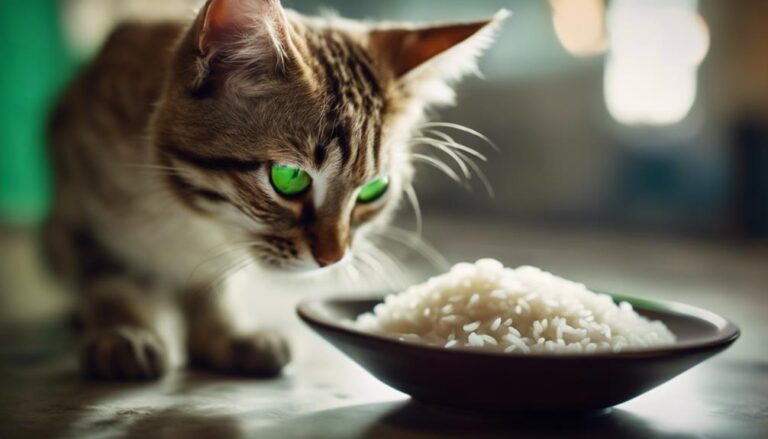If you've ever wondered whether your feline companion can enjoy a few Cheerios alongside you, the answer might surprise you. While it's true that cats can technically have Cheerios, there are some crucial factors to consider before you offer them a bowl. The potential risks involved may make you think twice about sharing your breakfast with your curious cat. But why exactly should you proceed with caution when it comes to this popular cereal and your furry friend?
Potential Risks of Cheerios for Cats
What dangers do Cheerios pose to your feline companion?
Cats, as obligate carnivores, can experience serious health issues from consuming Cheerios. While a few plain Cheerios may not harm your cat, large amounts can lead to an upset stomach, diarrhea, or nausea.
It's crucial to keep chocolate Cheerios away from your cat, as they contain theobromine, which is toxic and can cause abnormal heart rhythm, seizures, and tremors.
Additionally, the high sugar content in Honey Nut Cheerios can contribute to diabetes and obesity in cats if consumed regularly.
If your cat displays any symptoms after eating Cheerios, such as vomiting, lethargy, or tremors, it's essential to seek immediate veterinary attention. Cats shouldn't have Cheerios as a regular part of their diet to avoid potential health risks.
Moderation and portion control are key when it comes to feeding your feline friend, ensuring their diet aligns with their carnivorous nature.
Moderation and Portion Control
To ensure your cat's well-being, carefully regulate the amount of Cheerios they consume to prevent any negative effects on their health. Moderation and portion control are crucial when it comes to feeding your cat Cheerios. Added sugars in Cheerios can be harmful if consumed excessively, so it's important to limit the number of Cheerios offered to your cat to maintain a balanced diet. Treats like Cheerios should be given sparingly and shouldn't replace nutritious meals in your cat's diet.
Monitoring your cat's weight and overall health is essential when introducing new treats like Cheerios. Keep an eye on any changes in weight or behavior that may indicate that your cat isn't reacting well to the Cheerios. By managing portion sizes and ensuring moderation, you can incorporate Cheerios into your cat's diet as an occasional treat without compromising their health. Remember, your cat's well-being should always come first when considering adding new foods to their diet.
Nutritional Value Considerations
Considering the nutritional value of Cheerios for cats is essential to understand their limited benefits in feline diets. While Cheerios may seem like a somewhat healthy option for a quick snack, they lack essential nutrients that cats need. Cats are obligate carnivores, meaning their diets should primarily consist of protein sources from animal meat.
Grains, such as those found in Cheerios, don't mimic their natural diet and can be harmful to cats if consumed in large quantities. Even though cats can eat Cheerios, it's crucial that they only consume small amounts as a treat. The sugar content in Cheerios can lead to gastrointestinal upset and weight gain in cats, making them an unsuitable regular snack choice.
To ensure your cat's health and satisfaction, it's best to opt for treats that align more closely with their dietary needs, such as fish, meat, and certain fruits and vegetables. Remember, moderation and proper nutrition are key when considering what your cat eats.
Consultation With Veterinarian
Before introducing Cheerios to your cat's diet, consulting with a veterinarian is highly recommended to ensure their safety and suitability for your cat's specific health requirements. Veterinarians can provide guidance on suitable treats, including Cheerios, to help maintain your cat's overall health.
During the consultation, it's essential to discuss any potential risks associated with feeding Cheerios to your cat. Your veterinarian can offer personalized advice on the appropriate portion sizes and frequency of Cheerios as treats for your cat, taking into consideration their individual needs.
Seeking professional advice from a veterinarian can help prevent any adverse effects or health issues that may arise from feeding Cheerios to your cat. Remember, your veterinarian knows your cat best and can provide tailored recommendations to ensure your cat's well-being when introducing new foods like Cheerios into their diet.
Importance of Balanced Diet
When it comes to your cat's well-being, ensuring they receive a balanced diet is key to their overall health and nutrition. Here are some essential points to consider:
- A meat-based diet is crucial for meeting your cat's nutritional needs, providing essential proteins for growth and maintenance.
- Balancing treats like Cheerios with a meat-based diet ensures your cat's overall health is maintained.
- Fiber from Cheerios shouldn't be a primary source in your cat's diet; focus on meat to meet their dietary requirements adequately.
- Providing a balanced diet is essential to meeting all of your cat's nutritional needs, promoting a healthier lifestyle.
- Consulting a veterinarian for guidance on your cat's diet is crucial to ensure they receive the right nutrients in the right proportions.
Healthier Alternatives for Cats
You can explore nutritious options like fish or meat chunks and low-lactose cheese as healthier snack choices for your cat. Consider feeding them healthy fruits and vegetables such as spinach, carrots, berries, and melons based on their preferences.
Opt for treats that are more suitable for cats rather than Cheerios to ensure their diet is balanced and beneficial.
Nutritious Cat-Friendly Options
For cats seeking nutritious snacks, consider offering small, boneless fish or meat chunks as a healthier alternative to Cheerios. When choosing cat-friendly options, keep in mind their dietary needs and preferences.
Here are some nutritious choices for your feline friend:
- Low-lactose cheese: A tasty snack option for some cats.
- Healthy fruits: Such as berries and melons, adding variety to their diet.
- Nutrient-rich vegetables: Spinach and carrots are great choices for your cat.
- Meat: A natural protein source that many cats enjoy.
- Fish: Rich in omega-3 fatty acids, beneficial for your cat's health.
Remember to prioritize your cat's well-being by offering them these healthy options instead of processed human foods like Cheerios.
Homemade Treat Ideas
Consider preparing homemade treats for your feline companion using nutritious ingredients like fish, meat, low-lactose cheese, and various fruits and vegetables.
Small chunks of fish or meat can be a healthy snack option for your cat. Low-lactose cheese, offered in moderation, can also be a suitable treat.
Healthy fruits and vegetables such as spinach, carrots, berries, and melons are nutritionally beneficial options for your cat's snacks. Cats have individual preferences, so observe which fruits and vegetables your cat enjoys the most.
Opting for these homemade treat ideas can promote your cat's long-term health better than processed snacks like Cheerios. Remember to provide these treats in small portions to maintain your cat's overall well-being.
Frequently Asked Questions
Is Cheerios OK for Cats?
Cheerios are not the best choice for cats. They contain harmful ingredients like sugar and corn starch. Opt for healthier treats to avoid long-term health risks. Your feline friend deserves snacks that promote their well-being.
Is It OK if My Cat Eats Cereal?
Eating cereal is not ideal for your cat. It contains ingredients that could be harmful. It's best to stick to a balanced feline diet to ensure your furry friend stays healthy and happy.
Can Cats Eat Peanut Butter?
You can safely feed your cat peanut butter in moderation. Ensure it's unsalted, unsweetened, and xylitol-free. Watch for any adverse reactions. Peanut butter can be a rare treat or a helpful way to administer medication, but don't overdo it.
Can Cats Have Cheetos?
Avoid giving Cheetos to your feline friend due to high unhealthy fats, artificial additives, and potential health risks. Stick to cat-friendly treats to ensure your cat's well-being and avoid digestive issues or obesity problems.

